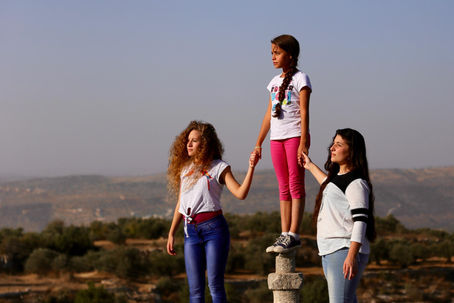Sights set on youth education despite limited rights to movement and IDF violence in West Bank villa
- Cynthia Wang
- Oct 5, 2016
- 4 min read

The youth of Hizma village have found hope in new educational programs and united powers between villagers. Although they often have their studies disrupted by Israeli road blocks on the way to school or violent clashes inside village, their determination to succeed in their education soars beyond the Wall.
“We believe that education should be a better way to resist than throwing stones at soldiers,” said Issam to the Palestine Monitor, a volunteer from the International Youth Forum (IYF) and a hizma resident.
Located in the West Bank with a distance less than 7km north to the old city of Jerusalem, Hizma is segregated and isolated by the Wall where harassment from settlers or armed soldiers happen often on a daily basis.
Aiming to teach young children of their civil rights and medical lessons, Palestinian Medical Relief Society (PMRS) and IYF provide both summer camps and courses. They not only aim to give youth a better understanding of the occupation, but also to educate them on how to raise people’s awareness around the world about the injustices they face, rather than directly confronting military operations.
“They teach us how to be confident. It is very important when you face difficulties that you are not afraid of speaking up for yourself.” Aia, a 17-year-old girl from Hizma who first participated the course four years ago and is now volunteering with PMRS, explained to the Palestine Monitor.
While it is true that there are a number of schools in Palestine teach girls and boys separately, organizations such as PMRS and IFY working in Hizma have supported and encouraged youths to interact with each other in mixed group activities.
“At first my parents don’t want to allow me to attend the course. But they saw how I have become more and more confident in myself.”
Aia told the Palestine Monitor how breaking the barriers between boys and girls has changed her parents’ attitudes to her and improved the unity between villagers. She particularly mentioned that now she no longer fears to ask for helps from either male or female villagers when Israeli soldiers come here.
“I was shy before. But now I know we need to help each other. Guys help girls. We feel comfortable to stay side by side. ”
Since April, the barriers have been blocking the roads, sealing off the village for indefinite periods. Youth have often had to go through at least three checkpoints and roadblocks in order to reach their schools. The devastation that occurs here is not just the restrictions on movement, but also rights to education and the psychological impacts for village youth.
“What worries us is kids play on the street, they sometimes don’t know the danger of it and think it’s a game,” Muwafiq told the Palestine Monitor.
Youth fall victim to the daily disruption in particular during the summer or winter vacations. Muwaffiq told us the rate of children being harassed or arrested rises when students do not need to go to schools and spend most of their time in the village, recalling when the village was under siege for nearly a month from July to August.
“They throw tear gas or explosive objects to everyone if they see someone throws stones, or even when nothing happens, they still do,” Issam explained. His son had his leg injured by an explosive object thrown randomly by Israeli soldiers two years ago beside their house.
Saleh, a 16-year-old boy, was shot by an explosive bullet in the leg by Israeli solider in December, 2015 after returning from his school exams. “They (Israeli soldiers) left me one hour bleeding. No ambulance, no one helped me.”
Saleh was then accused of offensively pushing soldiers while in fact he was resisting soldiers to enter the mosque where many other children were in present. He was detained for one month in Ofer prison until his family paid a 4,000 NIS financial fine. Saleh had to drop out of school for 6 months to recover.
Another child, Ismail, was arrested at the age of 14. He was detained one day and accused throwing stones at settlers. His house is beside the bypass road, which is an Israeli-built road used by settlers to connect to the main road or other settlements.
“They came at midnight. They said I threw stones at settlers but I didn’t. I was just playing around my house. They arrested me and put me outside the building. I was afraid and cold,” said Ismail, recalling his memory from that night in late December. He was released on the grounds that there was no evidence for his arrest.

Administrative detention is a detention without trial or charge by authorized administrator. Under international law, this can only be used in exceptional circumstances such as if the person is risk of committing more crime that cause harm in the future. However, this has become a common strategies used by Israel against Palestinian children. According to Defence for Children International Palestine, at least 199 children are being held in military detention every month.
“We lost most of our lands, where else do you expect kids to play?” said Muwaffiq, “but we are trying our best to organize camps and educational events for children here, so that they don’t feel bored after school and to keep them away from soldiers on the street.”
“We want to teach the teenagers here, the hope for Palestinians now is to achieve better education. This is the most important thing for them to raise awareness internationally and to end the occupation someday,” Issam concluded.




Comments